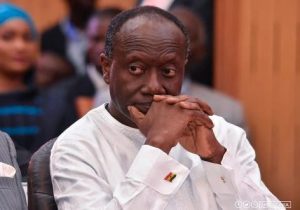
Accra, November 14, 2017//-Preliminary data shows the economy expanded at the fastest pace in close to three years in quarter two ( Q2), led by a spectacular performance in the mining and quarrying sector, and a boost in oil output as producers sought to cash in on higher oil prices.
A second estimate compiled by FocusEconomics, a leading provider of economic analysis and forecasts for 127 countries in Africa, Asia, Europe and the Americas noted: “Growth in the service sector also picked up. Stronger private sector activity, as evidenced by a record-high PMI in September, suggests the stellar economic growth trajectory extended into Q3”.
Higher oil revenues have also accelerated progress in implementing corrective fiscal measures aimed at reducing the economy’s heavy public debt burden.
On 10 October, S&P upgraded the outlook on Ghana’s credit rating from stable to positive. Finance Minister Ken Ofori-Atta announced on 12 October that roadshows would be held in Washington, New York, Boston and London to sell debt worth USD 1.4 billion denominated in the local currency.
The government remains resolute in clearing debts owed by state-owned electricity and petroleum utilities.
Growth momentum should remain strong next year as the Sankofa and TEN oil fields ramp up oil production and fiscal consolidation measures encourage greater investment.
Moreover, the International Tribunal for the Law of Seas (ITLOS)’s ruling in favour of Ghana—which had been embroiled in a three-year long maritime dispute with the Côte d’Ivoire— should lead to higher FDI inflows.
FocusEconomics panelists project the economy to grow 6.1% in 2018 and see growth slowing to 5.5% in 2019. • Inflation fell to 12.2% in September from 12.3% in August.
FocusEconomics panelists project inflation will dip towards the Central Bank’s 6.0%–10.0% target range, averaging 10.6% in 2018 and 9.9% in 2019.
REAL SECTOR: Growth shoots up to nearly-three year high
According to a provisional estimate by the Ghana Statistical Service, year-on-year (yoy) economic growth skyrocketed in the second quarter of the year to 9.0%, the highest rate in nearly three years, which follows strong 6.6% growth in the first quarter.
Furthermore, Q2’s stellar performance was broad-based. Industry recorded the fastest rate of expansion at 19.3% (Q1: +11.5% year-on-year) due to exceptional 75.0% growth in mining and quarrying, which far outstripped the performance of all other sub-sectors, and a boost in oil production, thanks to the in surge in oil prices.
Output of oil and gas, which constitute key commodity exports of the Ghanaian economy, grew by over 188.0% compared to the previous year as the Sankofa and TEN oil fields ramped up production.
The services sector picked up from the previous quarter (Q2: +5.6% yoy; Q1: +3.7% yoy), led by a notable acceleration in the health and social work sub-sector, along with strong growth in information and communication.
It was supported by growth in the education, and real estate, professional, administrative and support sub-sectors. Meanwhile, the agricultural sector expanded at a slower rate than the previous quarter (Q2: +3.4% yoy; Q1:+7.6% yoy) due to a double-digit contraction in fishing, a sharp contrast to the double-digit expansion reported in Q1.
Going forward, the economy should continue along the strong trajectory seen since the start of the year as oil production increases and the services sector sustains its sturdy pace of expansion.
On 11 October, the Finance Minister, Ken Ofori-Atta, speaking at the Ghana Integrated Financial Management Information System (GIFMIS) forum, stressed the government’s commitment to curb “wasteful public spending” to reign in the budget deficit and bring about more sustainable management of public finances.
This should lend support to an improved business climate and encourage greater foreign investment. FocusEconomics Consensus Forecast panelists expect the economy to expand 6.1% in 2018, which is down 0.4 percentage points from last month’s forecast, and 5.5% in 2019.
REAL SECTOR: PMI soars to record high in September
The composite Purchasing Managers’ Index (PMI), sponsored by Stanbic Bank and produced by IHS Markit, climbed to a survey record of 56.5 in September, up from 56.1 in August.
The monthly survey of business conditions in the Ghanaian private sector has been conducted since January 2014, but the findings were only publicly released from September 2017. September’s print sits comfortably above the 50-point threshold that separates expansion from contraction, marking 20 months of uninterrupted improvements in business conditions.
Following stellar growth in Q1 and Q2 of this year, new orders continued to climb, fueling another month of increasing output and a rise in firms’ purchasing activity.
Firms employed more workers in order to facilitate the sustained surge in output, hiring additional staff at the fastest rate in the survey’s history.
As a result of the expansion in operating capacity, backlogs of work dropped for the fourth consecutive month.
Input costs jumped due to higher fuel costs, port duties and rising wages, prompting most firms to increase output prices modestly as they struck a trade-off between remaining competitive and covering higher costs.
Some firms reduced prices in a bid to attract more customers. Ayomide Mejabi, Economist at Stanbic Bank, offered an outlook on the economy, stating: “We remain confident that growth of the Ghanaian economy will continue to be buoyed by robust output from the oil sector, reaching 6.0% y/y in 2017.
That said, we have our reservations about a revenue-inspired fiscal consolidation effort and look for authorities to cut expenditure in line with revenue undershoots.”
FocusEconomics Consensus Forecast panelists expect fixed investment to expand 5.4% in 2018, which is down 2.2 percentage points from last month’s forecast. For 2019, panelists expect fixed investment to grow 5.9%.
MONETARY SECTOR: Inflation inches down in September
Consumer prices came in flat in September compared to the previous month, following a 0.2% drop in August. The upturn was driven by higher prices for food and non-alcoholic beverages.
Conversely, inflation inched down to 12.2% in September from 12.3% in August. Elevated inflation and the risks of increasing price pressures prompted the Bank of Ghana to halt its easing cycle and keep rates unchanged at September’s monetary policy meeting. Annual average inflation fell to 13.3% in September from 13.7% in August. FocusEconomics Consensus Forecast panelists expect inflation to average 10.6% in 2018 and 9.9% in 2019.
MONETARY SECTOR: BoG puts an end to the easing cycle, leaves the policy rate unchanged
At its 22 September monetary policy meeting, the Bank of Ghana (BoG) kept the monetary policy rate unchanged at 21.0%, putting a halt to the easing cycle that was initiated at the end of 2016.
The decision came as a surprise to analysts, who had expected a rate cut of 100 basis points. The Bank’s decision to pause the easing cycle comes amid an increase in inflation, which moved further away from the target upper bound of 10.0%. Inflation rose from 11.9% in July to 12.3% in August, after three consecutive months of declines.
Moreover, core inflation—which excludes energy and utility prices—also climbed to 13.1% in August, up from 12.6% in July. Although a recent survey conducted by the Bank points to a drop in inflation expectations, the Monetary Policy Committee opted to take a cautious stance and leave the rate unchanged in light of increasing price pressures that are dimming the inflation outlook.
The move is expected to return inflation to within the Bank’s medium-term target of 8.0% plus or minus 2.0% in early 2018, provided there are no unexpected shocks.
While the economy recorded another quarter of stellar growth in Q2, led by a robust oil sector, the Bank expressed concerns about tighter expected global financing conditions that could pose risks to economic prospects.
The Bank’s statement was devoid of any substantive forward guidance, simply stating that the Bank will remain vigilant of the impact of emerging price pressures on the inflation outlook and take necessary measures in the event that they persist.
In accordance, FocusEconomics panelists also see inflation returning to within the Bank’s target range by the end of next year. The next monetary policy meeting is scheduled for 24 November. FocusEconomics Consensus Forecast panelists expect the monetary policy rate to end 2018 at 16.60% and 2019 at 15.33%.
African Eye Report




